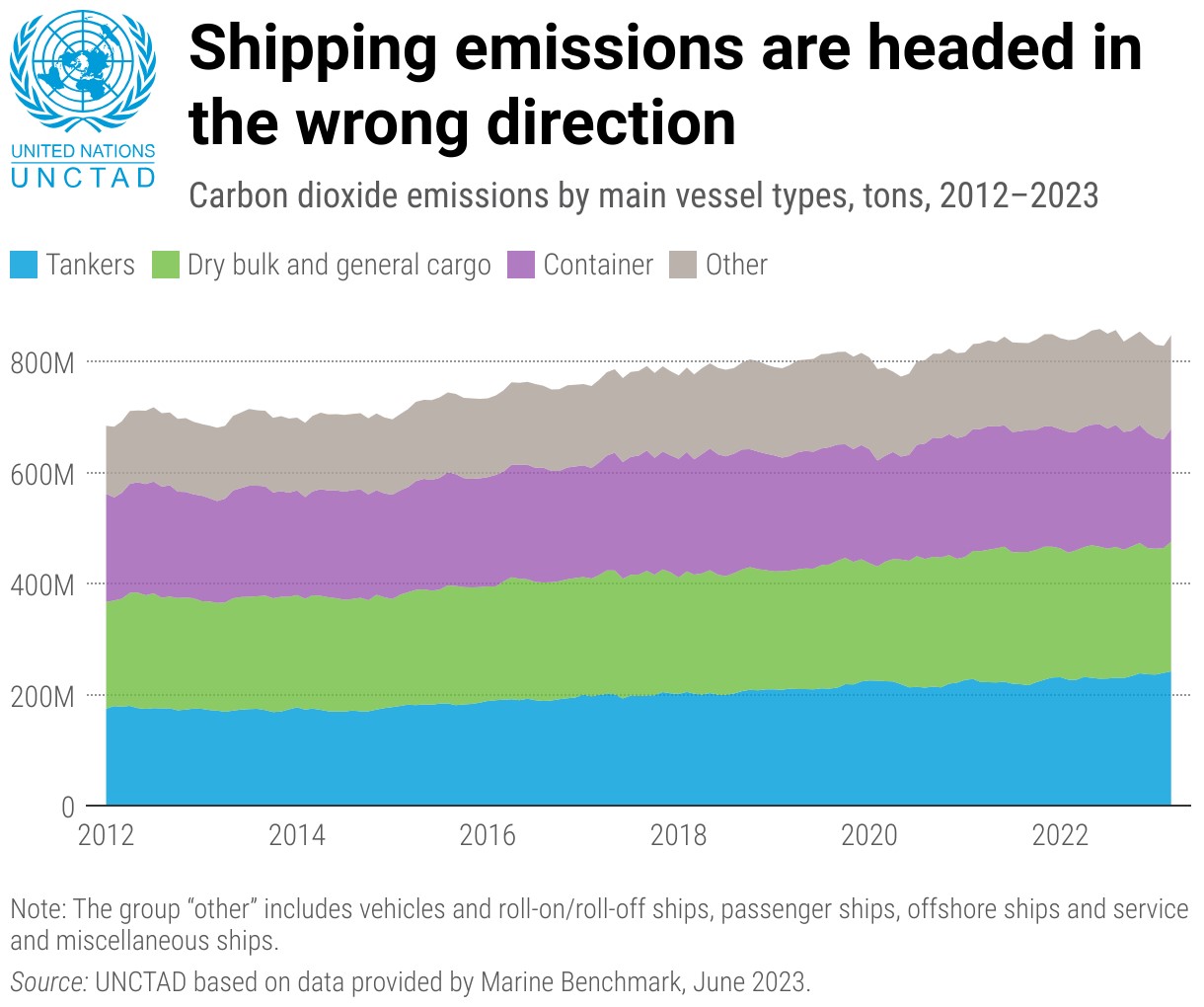UNCTAD has called for a „just and equitable transition“ to a decarbonized shipping industry in its Review of Maritime Transport 2023 launched ahead of World Maritime Day (28 September).
The agency highlights the pressing need for cleaner fuels, digital solutions and an equitable transition to combat continued carbon emissions and regulatory uncertainty in the shipping industry.
The shipping industry accounts for over 80% of the world’s trade volume and nearly 3% of global greenhouse gas emissions, with emissions escalating by 20% in just a decade.
UNCTAD Secretary-General Rebeca Grynspan said: „Maritime transport needs to decarbonize as soon as possible, while ensuring economic growth. Balancing environmental sustainability, regulatory compliance and economic demands is vital for a prosperous, equitable and resilient future for maritime transport.“
A push for cleaner fuels
UNCTAD, ahead of the United Nations climate conference (COP28) in November of this year, advocates for a shift towards cleaner fuels in shipping, emphasizing the need for an environmentally effective, procedurally fair, socially just, technologically inclusive and globally equitable transition strategy.
The organization underscores the importance of system-wide collaboration, swift regulatory interventions, and robust investments in green technologies and fleets.
While the transition to cleaner fuels is in its early stages, with nearly 99% of the global fleet still reliant on conventional fuels, the report cites promising developments, including 21% of vessels on order designed for alternative fuels.
Decarbonization costs mount
However, the transition comes with substantial costs. UNCTAD reports that an additional $8 billion to $28 billion will be required annually to decarbonize ships by 2050, and even more substantial investments, ranging from $28 billion to $90 billion annually, will be needed to develop infrastructure for 100% carbon-neutral fuels by 2050.
Full decarbonization could elevate annual fuel expenses by 70% to 100%, potentially affecting small island developing states (SIDS) and least developed countries (LDCs) that heavily rely on maritime transport.
To ensure an equitable transition, UNCTAD calls for a universal regulatory framework applicable to all ships, irrespective of their registration flags, ownership or operational areas, thereby avoiding a two-speed decarbonization process and maintaining a level playing field.
Shamika N. Sirimanne, UNCTAD’s director of technology and logistics, said: „Economic incentives, such as levies or contributions paid in relation to shipping emissions may incentivize action, can promote the competitiveness of alternative fuels and narrow the cost gap with conventional heavy fuels.“
„These funds could also facilitate investments in ports in SIDS and LDCs, focusing on climate change adaptation, trade and transport reforms, as well as digital connectivity,“ Ms. Sirimanne added.
An ageing global fleet
UNCTAD further expresses concern over the ageing global shipping fleet – at the start of 2023, commercial ships were on average 22.2 years old, two years older than a decade ago. More than half of the world’s fleet is over 15 years old.
Ship owners face the challenge of renewing the fleet without clarity regarding alternative fuels, green technology and regulatory regimes to guide ship owners and ports, while port terminals face similar challenges in vital investment decisions.
Digitalization for decarbonization
In addition to cleaner fuels, UNCTAD underscores the role of digitalization in accelerating decarbonization efforts, citing the benefits in enhancing efficiency and reducing delays.
„Investing in digitalization and technology will improve predictability and reliability of shipping, and applying technologies such as AI, machine learning, blockchain and the internet of things will result in performance optimization for monitoring, routing, speed and predictive maintenance – which can all help accelerate decarbonization,“ Ms. Sirimanne said.
Shifting global trade
The Review of Maritime Transport analyses the shifting global trade patterns and the impact of events like the war in Ukraine, highlighting the resilience of the shipping industry while acknowledging the challenges of balancing supply and demand.
Driven by disruptions from the war in Ukraine, oil cargo distances reached an all-time high in 2022, and shipments of grain in 2023 have travelled further than in any year on record, as grain importing countries have been forced to seek alternative exporters such as the US and Brazil, which require long-haul shipping.
Global shipping industry remains resilient
Despite a 0.4% contraction in total maritime trade volumes in 2022, the industry anticipates a 2.4% growth in 2023, with containerized trade (which declined by 3.7% in 2022) expected to expand by 1.2% in 2023 and more than 3% between 2024 and 2028.
Oil and gas trade volumes showed robust growth in 2022, while tanker freight rates saw a strong revival driven by geopolitical events. Dry bulk rates experienced volatility due to shifting demand, port congestion, geopolitical tensions and weather disruptions.
See the main maritime transport facts and figures for Africa, Asia, and Latin America and the Caribbean.
In conclusion, UNCTAD’s call for a just and equitable transition to a low- and zero-carbon future in global shipping serves as a call for system-wide commitment and regulatory action to combat the escalating environmental challenges faced by the maritime sector. Bold and timely action and collaborative efforts are essential to ensure a sustainable, resilient and prosperous future for maritime transport.

